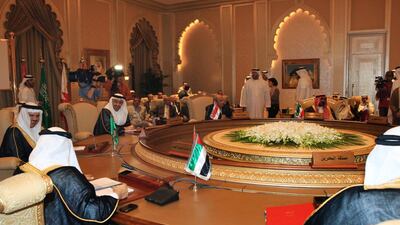RIYADH // GCC foreign ministers have reached a deal on a security pact, marking a possible first step towards bridging deep rifts among its states.
Qatar’s foreign minister Khalid bin Mohammed Al Attiyah took part in the GCC foreign ministers meeting held in Riyadh, where an agreement was reached that the policies of member states should not undermine the “interests, security and stability” of each other, the GCC said. Nor should they impinge on the “sovereignty” of another member.
Thursday night’s meeting marked the foreign minister’s first visit to Saudi Arabia since the kingdom, along with the UAE and Bahrain, withdrew their ambassadors from Qatar in an unprecedented public protest largely believed to be spurred by Doha’s support for the Muslim Brotherhood.
“This could be a new beginning, this could be a new page in Qatar-Emirati relations and in Qatar’s relations with all of the GCC,” said Dr Mustafa Alani, head of security and terrorism at the Gulf Research Centre said yesterday.
“I think Qatar now understands that their policy has a negative implication on the security of the GCC states and they agreed ... that this sort of policy must be under supervision and monitored. So, I think it is a new principle introduced between the GCC states.”
Thursday’s statement did not say whether ambassadors would be reinstated.
The ambassadors were officially withdrawn on March 5 after Abu Dhabi, Riyadh and Manama said Qatar failed to uphold its end of a security agreement to stop interfering in other nations’ politics and supporting organisations that threaten the Gulf’s stability.
They said the move was made to protect their security.
The UAE and Saudi Arabia perceive the Islamist Brotherhood as a threat to their political systems. Riyadh has declared the Brotherhood a terrorist group, a move supported by the UAE and Bahrain.
Kuwait, which has Islamists in parliament, and Oman were the only countries in the council not to join in the diplomatic protest. Oman’s foreign minister, Yusuf bin Alawi, was quoted just before Thursday’s announcement in the Pan-Arabic newspaper Al Hayat declaring that the crisis “between brothers” had ended and was “a thing of the past”.
Analysts do not expect Qatar’s policies will dramatically swing closer to those of Saudi Arabia.
Qatar gave billions of dollars in aid to the Brotherhood-backed government of the Islamist president Mohammed Morsi before he was ousted by the army last year. Saudi Arabia, the UAE and Kuwait trumped that support with billions of dollars to Egypt’s new military-backed government as it cracked down on the Brotherhood and its supporters.
Additionally, the Qatar-based and funded Al Jazeera Arabic news channel has been criticised in Egypt, and is not believed to be viewed favourably by Saudi Arabia and the UAE’s leaders.
Simon Henderson, director of the Gulf and Energy Policy Program at The Washington Institute, said in an analysis that “Qatar is likely unwilling to eat humble pie”.
“Unlike [Saudi] King Abdullah and certain other Gulf leaders, Doha seems to view its own quasi-monarchial political system as above any potential Brotherhood threats,” he wrote, adding that Qatar has also been in competition with Saudi Arabia for influence among Syria’s opposition seeking to oust Bashar Al Assad, “though it may be easing up on that posture.”
A sticking point for the UAE’s relationship with Qatar had been Egyptian-born imam Youssef Al Qaradawi’s fiery sermons in Doha, in which he criticised Gulf countries for their support of Egypt’s interim government.
Mr Al Qaradawi has close ties with the Brotherhood and his sermons were carried live on Qatar state television. He has not appeared on television or at sermons since ambassadors were withdrawn.
A Gulf official said the envoys of Saudi Arabia, the UAE and Bahrain will not return to Doha until Qatar demonstrates its good intentions.
“The ball is now in Qatar’s camp,” the Saudi former diplomat Abdullah Al Shammari told AFP.
* Associated Press with additional reporting by Roberta Pennington from Abu Dhabi

